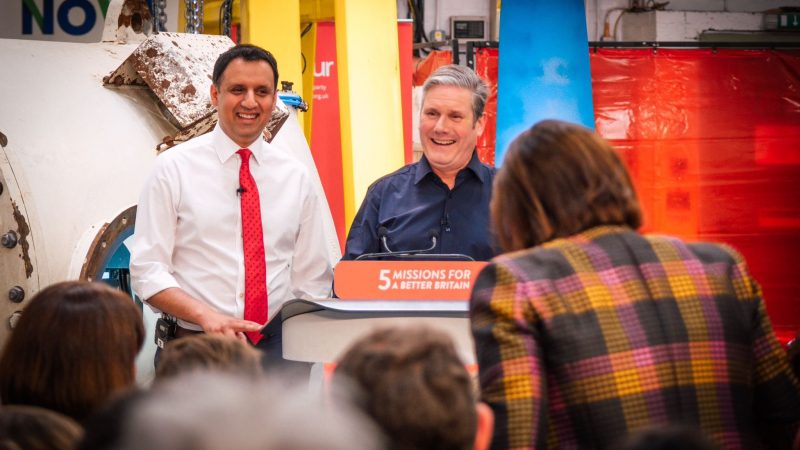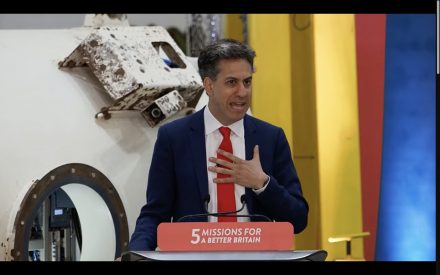
Keir Starmer set out how Labour would seek to make Britain a “clean energy superpower” in a speech in Leith, Scotland, today.
New announcements included plans to headquarter a new Great British Energy company in Scotland, planning reform to accelerate green energy projects, lifting the onshore wind ban in the first months of government and a British Jobs Bonus incentive for clean energy investment.
Yet the speech – which you can read in full elsewhere on LabourList – was revealing about more than the detail of Labour’s green policy plans, which form the fourth of five central “missions” unveiled so far by the party under Starmer. Here’s what else we learned:
Starmer makes green plan a jobs and bills issue
Starmer emphasised again that Labour’s plan goes beyond a response to the climate crisis, highlighting its potential to create jobs across the country, bring down energy bills and improve the UK’s energy security.
His particular focus on jobs – echoed by Ed Miliband and Anas Sarwar in speeches preceding Starmer – and reducing costs for households suggests that Labour sees this angle as far more of a vote-winner than an offer centred on the climate emergency, perceiving a need to highlight the potential benefits of a well-executed transition to clean energy over the changes and sacrifices that will likely be required from consumers.
Polling supports this approach, finding that the potential personal financial impact of net-zero policies undermines public backing and that support for such policies is lower among those significantly impacted by increases in the cost of living.
The ‘jobs, jobs, jobs’ angle is also an attempt to assuage the concerns of trade unions and workers – especially those within the oil and gas industry – who fear potential job losses in the transition to net zero.
The Labour leader stressed that his party has a “credible plan to manage the change, protect good jobs and create good jobs”, declaring that, under Labour, there would be “no cliff edges” and no repeat of the devastation caused by deindustrialisation in the 1980s.
Today I launched Labour’s mission to make Britain a clean energy superpower by 2030.
We will cut bills, create good jobs across the whole of the UK, and deliver energy security.
With GB Energy, a publicly-owned energy company, headquartered here in Scotland. pic.twitter.com/hyTBjIbl8W
— Keir Starmer (@Keir_Starmer) June 19, 2023
Shadow cabinet make a show of unity
There have been reports of disquiet in the Shadow Cabinet over the size and scope of the green transition plans, culminating in the recent row-back of the £28bn annual spending commitment: instead of hitting the ground running with this level of expenditure, the party will now ratchet up to the sum instead.
The suggestion had been of a tension between Shadow Net Zero Secretary Ed Miliband’s desires for a large-scale (read, expensive) green transition plan a la Biden’s “Inflation Reduction Act”, and Shadow Chancellor Rachel Reeves’ desire for “iron-clad” fiscal rules.

Starmer has been portrayed as more sympathetic to Reeves in such arguments – not least because he chose to replace Shadow Chancellor Anneliese Dodds, who, like Miliband, is typically seen as more on the soft left than the moderate wing of the party.
Despite – or in greater likelihood because of- these rumours, it was all smiles in Leith this morning. Keir Starmer’s main event speech was preceded by short addresses from Reeves, Miliband and Scottish Labour leader Anas Sarwar.
Miliband was whole-hearted in his praise of Starmer and Reeves, saying Britain would have a prime minister and chancellor “driving this agenda as never before” – though cynics might note this also pointedly makes clear it is not his agenda alone.
Planning reforms now a wedge issue on climate and housing alike
Many were surprised by the strength of Keir Starmer’s recent push on planning reform as a mechanism to solve the housing crisis: after all, “not in my backyard” has long been one of the most powerful phrases in British politics, particularly at a local level.
But just as Labour is following big talk with big policy (statutory obligations around housebuilding) when it comes to housing, the party seems to be doing the same when it comes to planning reform as a tool for the green transition.
Starmer stressed that “it can take up to 13 years to develop a new offshore wind farm”, and pledged to lift the government’s onshore wind ban within months of coming to power, and to speed up the planning process for such developments.
(Green agenda) Patriotic, security agenda
As well as focusing Labour’s green pitch on bread-and-butter issues, the party is also trying to channel both public pride in Britain, and public fears about Britain’s place in the world.
As well as naming the planned publicly owned energy body “Great British Energy” and dubbing it a “proper national champion”, Labour is also notably using the moniker “clean energy superpower” — with the “superpower” term more commonly associated with military or economic might. Starmer stressed the absurdity too of Malaysian and Munich authorities owning “more of our offshore wind assets than we do”.
Another eye-catching phrase, seemingly roadtested today for the first time, was what Starmer called his “simple, unifying priority: British power for British jobs”. It faintly echoes former prime minister Gordon Brown’s “British jobs for British workers” slogan, intentionally or otherwise.
The patriotic spin Starmer put on not only jobs but also energy security – saying Labour’s plan would “get Putin’s boot off our throat” – is also a pretty clear pitch to both swing voters and Brexit-backing, first-time Tory voters in 2019, pushing back on Conservative claims that Labour’s energy policy is being written by “eco-zealots” from Just Stop Oil.
Labour doubles down on Scotland revival bid
The speech – taking place in Leith in Edinburgh – was yet another demonstration of Labour’s growing ambition in Scotland and hopes of a resurgence amid the chaos engulfing the SNP. And Starmer made no secret of that in his speech, kicking it off by declaring: “Nobody should doubt it: the tide in Scotland is turning.”
The Labour leader attacked both the Tories’ and the SNP’s recent records in government, arguing that “the Tory-SNP era has failed miserably”, but also went further back, discussing the impact of deindustrialisation on Scotland, overseen by the Tories, and partly blaming the SNP for Thatcher’s rise to power.
But Starmer also outlined Labour’s vision for Scotland’s future under his party’s leadership, telling attendees that, while travelling around Scotland, he has seen the “green shoots” of a “new Scotland, a future Scotland, a Scotland that is once again the beating heart of Britain”.
He declared that the “creative genius” of Scotland is “critical” to the UK’s prospects on clean energy, an assertion backed up by Labour’s commitment to headquarter Great British Energy – a key plank of its policy platform – in Scotland. Anas Sarwar – one of the three senior Labour figures tasked with introducing Starmer – was given the opportunity of publicly announcing that pledge, describing it as a “huge opportunity for Scotland’s economy”.
The Scottish Labour leader’s prominence throughout the event, including joining Starmer on the podium to take questions from journalists, also gives an indication of the power dynamic the party hopes to project between UK Labour and the party in Scotland, Wales and the English regions.
Labour under Starmer has repeatedly emphasised its commitment to devolve power away from Westminster (though recent developments in areas like Birmingham have raised eyebrows), and Sarwar’s starring role today positioned him – and Scottish Labour – as a partner and equal in the Starmer project.
Economic credibility first, policy second
Labour might have backtracked on a growing list of commitments in recent years, but Reeves’ “fiscal rules” are not one of them.
“Day-to-day spending will be completely covered by the taxes we collect, and we will get debt as a share of our economy falling by the end of the next parliament. These are iron rules, and we must accept the consequences, because if you lose control of the economy, it’s working people who pay the price,” Starmer said.
It will be read by some as a stark warning to the party, whether members or shadow cabinet members, that they must rein in their policy or spending ambitions for a Labour government, because of an apparent trade-off between economic credibility and public largesse.
For some with a long memory it will conjure up the momentous words of former prime minister Jim Callaghan in the 1970s on the inability to “spend your way out of a recession”, similarly seeking to rein in the party’s big-spending instincts.
Oil and gas rowback: Labour jitters remain after attacks
Oil and gas has been a difficult issue for Labour as the party tries to match its large-scale environmental ambitions with the demands of internal and external stakeholders. The big internal opposition to Labour’s pledge to stop new North Sea oil and gas projects came from the unions, with both GMB’s Gary Smith and Unite’s Sharon Graham calling for the pledge’s reversal.
Outside of the unions, the SNP and the right-wing press have also been unhappy with this commitment, and clearly Labour feel they need to strike a compromising tone in this area.
Sarwar told the audience that “opponents want to suggest that our plans are in conflict with the ambitions of the energy sector in the north-east of Scotland”, but that “nothing could be further from the truth…there will be no cliff edge, there will be no turning off of the taps, oil and gas will play significant role in our energy sector for decades to come”.
Starmer emphasised that his renewables push was “not some kind of sack cloth and sandals” affair, but one grounded in the economic realities of the cheapest and most secure ways to power Britain. We can expect the party to continue making soothing noises on this – whether Gary Smith et al are at all soothed is another matter.




More from LabourList
‘Ukraine is Europe’s frontier – and Labour must stay resolute in its defence’
Vast majority of Labour members back defence spending boost and NATO membership – poll
‘Bold action, not piecemeal fixes, is the answer to Britain’s housing shortage’